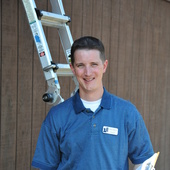Since there's less than a week left until the new home inspector licensing requirements go into effect, I thought it would be a great first topic to blog about. For those of you who haven't heard the news, here's a brief synopsis of what's happening in Washington State and what you need to be aware of moving forward.
Who: All home inspectors-new, seasoned, or otherwise.
What:Must be licensed through the Department of Licensing (DOL) in order to continue operating legally.
When: Starting Tuesday, September 1, 2009.
<added 9/14/09: Important Note: Some inspectors have until July 1, 2010 to operate legally as a "home inspector" without a license. Currently, the State of Washington has no easy way to designate these individuals from unlicensed inspectors operating illegally. If you work with an inspector who happens to fall into this category, it might be prudent to work with the inspector and the DOL to ensure that the inspector is operating within the bounds of the new licensing requirements.>
Where: Washington State.
Why: A home inspection bill was signed into law in 2008 outlining new requirements. (See RCW: 18.280.020 for details.)
How this Affects Home Buyers: After September 1, 2009, it is important to ensure that your home inspector is properly licensed through the DOL <added 9/14/09: OR falls within the bounds of an "unlicensed" home inspector operating legally. See "Important Note" above>. This is no different than ensuring your contractor, plumber, or electrician is properly licensed. There are two ways to check for this:
1. Ask your inspector for their new, three-digit license number (e.g., #123).
2. Verify that your inspector is listed as "active" under "licensed home inspector" in the DOL System: http://www.dol.wa.gov/business/checkstatus.html
3. <Added 9/14/09: If your inspector proves to be "unlicensed," work with your inspector and the guidelines provided by the DOL to ensure that the inspector is operating within the bounds of the new licensing requirements.>
It is also a good idea to find out whether or not your licensed home inspector will be keeping their Structural Pest Inspector (SPI) license. See "The Benefits of Hiring a Licensed Home Inspector with SPI Licensing" below.
How this Affects Realtors: After September 1, 2009, ensure that you do not recommend an unlicensed home inspector <added 9/14/09: who is operating illegally> to your clients. Doing so might be considered "unprofessional conduct," which is against the law. (See RCW: 18.235.130section 9 for details.) Before recommending a home inspector to your clients, use the above system to verify that the inspector is properly licensed <added 9/14/09: or is operating legally without a license>. It is also a good idea to find out whether or not the inspector will be keeping their SPI license.
The Benefits of Hiring a Licensed Home Inspector with SPI Licensing
Be aware that once licensed through the DOL, some inspectors may choose to drop their Structural Pest Inspector (SPI) licensing. This will primarily be a business decision each home inspector will have to make on their own, based on factors such as cost, market, and competition.
It is important to note that a licensed home inspector without an SPI license will now be allowed to identify conducive conditions for Wood Destroying Organisms (WDOs) (i.e., leaky faucet or rot). However, they will not be allowed to identify <changed 9/14/09: Wood Destroying Inspects (WDIs)> or damage caused by them and will not be required to carry insurance/bonding. (Some home inspectors may choose to carry insurance/bonding anyway; check with your home inspector to be sure.)
So, the basic benefits of hiring a licensed home inspector who is also an SPI include the following:
• If <changed 9/14/09: WDIs> or damage are found during the home inspection, a home inspector with SPI licensing can identify the <changed 9/14/09: WDI> and damage right then and there, rather than calling for another professional to come out later, saving the client additional time <changed 9/14/09: and/or> cost. (This is really no different than calling out a licensed plumber or electrician.)
• Licensed SPIs are required to carry E&O Insurance/bonding, which provides the client with a bit more protection should the inspector miss or omit something during the inspection.

Comments(10)